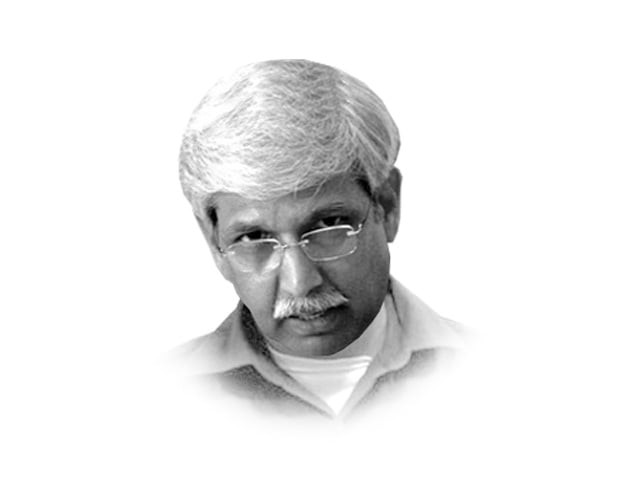Local governments et al
The local government, however, is a live issue with an ever increasing possibility that this too may slip.

The less said on Kashmir the better. Not that what Musharraf or his clique thought was perfect; it at least proposed a way out of stagnation. There was a move, some move. Though, I have always held there could not have been a more realistic appreciation of the ‘ground realities’ — Musharraf’s favourite word — than what the general came to realise after his terrible bungle in Kargil. Sometimes there is saving grace even in abject grief. Kargil may just have bestowed one in embracing realism. Whether the backchannel ever gets resurrected to the same level of intensity and acceptability, more from the Pakistani political stock, will remain moot, unless of course Ms Khar can pull a rabbit out of the Hermes.
The local government, however, is a live issue with an ever increasing possibility that this too may slip. The Karachi mayhem is built around this all important underlying concern. The MQM seeks holding onto the city in Mayoral colours, a la Musharraf and Tanvir Naqvi’s nizamate, while the remaining band of hopefuls in the PPP and the ANP, as indeed the religious parties in Karachi, wish division of Karachi into the erstwhile five districts under the commissionerate, paring some of MQM’s significant influence and balancing the playfield somewhat. These are unadulterated political motives and may well have been the real reason why Musharraf first succumbed to the idea in a quid pro quo arrangement with the MQM for support of his non-representative government. Bringing in the local bodies system through General Naqvi as head of the National Reconstruction Bureau had the dual objectives to neuter an overtly dominant and unrestrained bureaucracy gone astray, as well to endow favour to the MQM. It rankles sensibilities that both generals came from the same ethnic stock as the MQM, reinforcing a perception that the MQM was given a rather free hand under Musharraf manifesting in Karachi’s current troubles. Shafqat Mahmood and Tasneem Noorani, both former bureaucrats, lament the loss of the sheen off the DMG’s magisterial pomp in their respective pieces in The News of August 26, 2011 through the Musharraf/Naqvi action. Shafqat makes the point that our people still belong to the 18th century where 21st century concepts such as devolution and delegation remain alien to their system of functioning and therefore they need the iron hand of the 18th century bureaucracy.
Truth be told, the people deserve better. They may be stone-age ruffians just because we have chosen to keep them there, but simply because the state remains a sad abettor in their depravity and shameful bloodletting in the current round in Karachi is no reason for the bureaucracy to opportunistically clamour for their lost prestige and eminence. Similarly, regardless of the founding intent in its creation, local government brings closer to the people the ultimate dream of putting them in charge of their own destiny. If entities such as the MQM are alleged to have misappropriated the opportunity to their advantage by corrupting the police system, rectification measures need to be instituted to disable such a possibility. Also must be kept in mind a transformational improvement that Karachi underwent during the two consecutive mayorships under the Jamaat-i-Islami and the MQM.
Governments world over in progressive societies devolve to the lowest rungs. That is what makes the people equal shareholders in the state. If not, we may well be living in two different worlds with connectedness only through policy measures that touch a common man’s life. There is a sense that politics is continually dominating the essence of local government easily bartered as expedience.
Pakistan’s current predicaments are laden with transformational moments. We cannot afford to let the opportunity go to waste; depravity, else, will further radicalise the society. By making the common man the centre of our focus in facilitating a respectable living, in education and in social services, we just might begin to win him back from the extremists. These can only touch his life if the change occurs closer to him through his participation. Local governments are good and need to be resurrected with equal commitment.
To preclude exogenous corruption by the political parties, the district coordination officer (DCO) and the district police officer (DPO) should be kept independent of the nazim with clear administrative powers, while the nazim is devolved the financial authority and responsibility for development work appropriate to their level of devolvement. The nazim must be permitted political affiliation and may represent a political party in the local elections. Separation of powers between the nazim and the DCO and the DPO will act as checks and balances for each other. As representatives of the provincial bureaucracy, the two officials could also act as the eyes and ears of the government of the day, still being unable to interfere in nazim’s work — the latter approved through a council of elected members under him. This will also free the provincial and national parliamentary members to concentrate on their policy level work rather than remain bogged down with municipal works. Slight tweaking of the law can actually reinforce a good idea. We may just be able to pull our lost countrymen out of the 18th century dungeons.
Published in The Express Tribune, September 9th, 2011.















COMMENTS
Comments are moderated and generally will be posted if they are on-topic and not abusive.
For more information, please see our Comments FAQ